In Semester 45, we welcomed 13 students for the ACICIS Development Studies Immersion Program. 12 students undertook this program with the support of New Colombo Plan Mobility Program. Following the 6-week academic period learning Indonesian language at Universitas Gadjah Mada (UGM) as well as learning Indonesian development issues through seminar series and case study visits, all of the students undertook Development Placements for eight weeks, which were then concluded with final reflective presentations.
This semester, we had the honour to work with ViaVia Travel Jogja again, an organisation that aims to provide responsible tourism that focuses on community development. We partnered with ViaVia Travel Jogja for the placement of Prudence Bansemer (Murdoch University). At ViaVia, Prue assisted with the development of a new cultural tour in Desa Bagelan, Purworejo, which is known for their jathilan traditional trance dance. Prue also had several side projects such as attending the Global Sustainable Tourism Council (GSTC) Workshop where she learned how to produce the “Destination Assessment” for Desa Bagelan, conducting research on certification bodies for tourism, and organizing art workshops with Jogja’s renowned artist, Anagard.
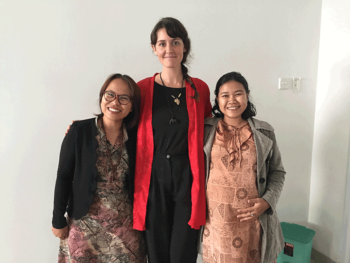
Also working in sustainable tourism this semester is Christopher Matthews (Murdoch University) who undertook his placement at Werkudara Travel Management. Chris assisted the Werkudara team with their community development projects, providing international education opportunities to orphaned girls. Alongside this, Chris also assisted Werkudara with their marketing, business model, and other capacity building trainings. During this semester, four ACICIS Development Studies Immersion Program (DSIP) students attended the International Conference of Rural Development & Community Empowerment 2017 (Endinamosis 2017) at the Institut Teknologi Bandung. Chris presented his paper on ‘Cultural Preservation Eco-Tourism’ at one of the parallel sessions. He was awarded the ‘Best Student Paper’ by the Endinamosis.
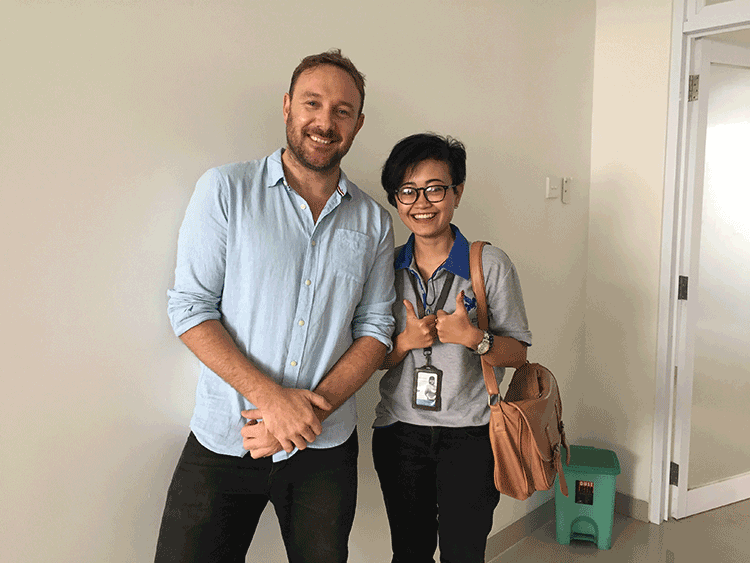
Rebekah Baynard-Smith (Monash University) and Lilian Frame (UNSW) also looked at tourism, but from community development and disaster risk reduction perspectives. Bekah and Lily were placed at Yayasan Sheep Indonesia (YSI), a non-government organisation with a mandate to empower communities, particularly in the fields of health, education, environmental sustainability and peace. Bekah and Lily were sent to six sub-villages of Mangunan District in Bantul Regency, Yogyakarta, to conduct assessment and observation on their community-based tourism potentials and disaster risk reduction strategies. Alongside this project, Bekah and Lily also taught English to the local tour guides in Mangunan and put together a bilingual booklet for tourists. Bekah and Lily concluded this project by providing a report and recommendations to the ‘Pokdarwis’ (‘Group for Tourism Awareness’) of Mangunan. YSI also took Bekah and Lily to Argomulyo sub-district to learn more about Disaster Risk Reduction infrastructure and an effort to channel cold lava without causing damage to the communities.
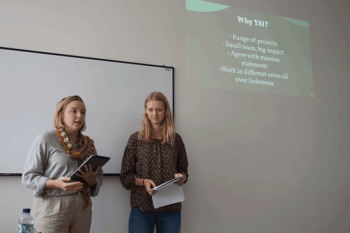
Saphron Stapleton (Murdoch University) had the opportunity to work with Arbeiter-Samariter-Bund Indonesia and the Philippines (ASB) in the area of inclusive Disaster Risk Management. Originating in Germany, ASB provide rapid and direct help to all those in need of support. In Indonesia, they are actively involved in regional and international policy forums and have developed a strong reputation for delivering practical inclusive disaster risk reduction (DRR) solutions. At ASB, Saphron assisted the team with developing the Inclusive Humanitarian Assessment Tool, which helps to identify the needs and the capacity of persons with disabilities during a humanitarian response. This Inclusive Humanitarian Assessment Tool has been used by the ASB team in areas surrounding Merapi Volcano, as well as in Bangladesh for the Rohingya Refugees. Saphron was also involved in several other projects at ASB, such as organising a workshop on putting ASB’s inclusion mandate into practice, attending a workshop on extending the implementation of inclusive disaster response in the Special Region of Yogyakarta, evacuation simulation with Disabled People’s Organisations, monitoring a Safe School program in Magelang, among others.
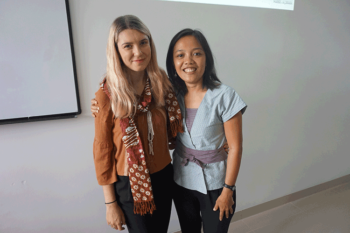
We are also very delighted to have Yayasan Satu Nama back as a Host Organisation this semester, welcoming Rivanthi Loganathan (The University of Adelaide) in their Community Empowerment team. Satu Nama is a non-profit organisation that focuses on community empowerment governance and political awareness on the basis of rights, respect, and resilience. Rivanthi joined the team to Keningar, Magelang, where illegal mining had been ongoing. Rivanthi had the opportunity to meet and speak with the community leaders, as well as conduct classes on children’s rights and environmental preservation for the children in the community. She also organised similar activities in Ngargosari and Banjaraya. The Satu Nama team also took Rivanthi to Pajanan, Bantul, to assist with facilitating meetings with local government on environmental preservation.
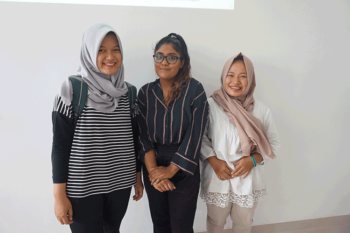
Similarly, Georga Baldock (Murdoch University) had the opportunity to interact with children and work on environmental sustainability with her Host Organisation, Rumah Inspirasi Jogja (RIJ). Established in 2011, Rumah Inspirasi Jogja is a community project starting from a family of four that wished to develop programs that promote friendship-tolerance and environmental awareness, one of which is through waste management. At RIJ, Georga assisted the team with workshops and training sessions on waste management, environmental sustainability and awareness to the communities. Georga also organised English classes for the children in the community, incorporating environmental sustainability in her teachings. Georga also assisted RIJ with updating resources and social media platforms.
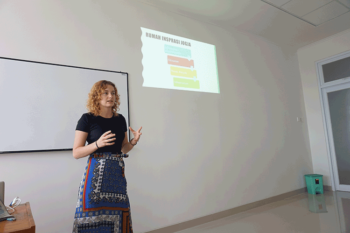
Bethani “Lo” King (RMIT University) looked into wildlife conservation and deforestation during her placement with Centre for Orangutan Protection (COP). Founded in 2007, COP works to counter crimes that threaten orangutan and their natural habitats. As part of this mandate, COP investigates, documents, exposes, and if necessary, readily confronts any persons or groups who threaten to disrupt the lives of orangutan or local communities living nearby. COP gave Lo the opportunity to head up to Berau, Kalimantan, to join and learn from the COP team on the ground. She assisted the COP team at the Rehabilitation Centre, where rescued orangutans are located and given medical attention. She also teamed up with Operasi Wallacea Terpadu (OWT) to give education on environmental preservation and orangutans conservation to primary school children in Berau. In Kalimantan, she also had the chance to visit protection forest – orangutan release site – as well as palm oil plantation. In Yogyakarta, Lo learned about GIS and organised a photo series that captures the stories of every staff member at COP and put them together into a calendar as part of COP’s campaign effort.
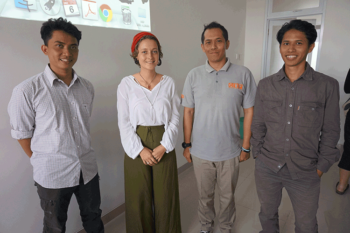
Brianna Kerr (UNSW) spent half of her placement with Jesuit Refugee Indonesia in Bogor and Cisarua. Jesuit Refugee Service (JRS) Indonesia is a humanitarian organisation that works in accompanying, serving, and advocating rights of refugees and those who are forced to be displaced. In Cisarua, Brianna presented and led discussions with 91 refugees in JRS extracurricular classes on nutrition, reproductive health for women and girls, introduction to Australia, Critical Thinking Exercise, Weather Seasons & Climate Change, as well as stress management. She also implemented JRS’ mandate in accompanying the refugees in Cisarua, providing physical and mental exercises to teenagers and helping the refugee women’s group with their handicraft project, ‘Beyond the Fabric’. At the Yogyakarta Head Office, Brianna helped the team with data analysis and research, utilised for advocacy and support, putting together information packages, as well as editing articles for the JRS Refugee Newsletter.

Lastly, DSIP students also worked in the area of sexual and reproductive health for their development placement. Tashinga Musingarabwe (UNSW) was placed at Yayasan Vesta Indonesia. Tash was involved in a range of Vesta’s projects and activities, including Mobile VCT through endutainment, as well as the launching of TestJog, an online platform to educate the community on HIV and AIDS and to provide information on where people can access tests. Through Vesta, Tash was also involved with a lot of activities with Yayasan Kebaya, an organisation that works in empowering transgendered communities as well as in AIDS prevention.
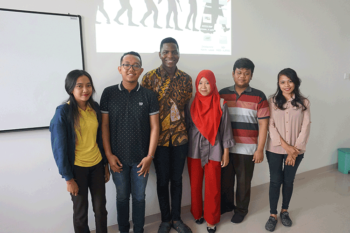
In the area of sexual and reproductive health, ACICIS also partnered with Perkumpulan Keluarga Berencana Indonesia – Special Region of Yogyakarta (PKBI DIY), for the placements of Ziana Diggles (Griffith University) and Olivia Hill (The University of Adelaide). Founded in 1910 and now established in twenty six provinces across Indonesia, PKBI is the oldest non-government organisation which pioneered the advocacy of family planning in Indonesia. Their main activities in Yogyakarta include research, community engagement, counselling, and outreach advocacy, among others. Ziana and Olivia joined the Media Division of PKBI DIY. With her background in design and creative arts, Ziana took the role as the Graphic Designer, Social Media and Videographer for the team. Playing with colour palette and concise design, she assisted PKBI DIY with updating their pap-smear information brochures and presentation slides. To assist with the development of these brochures, Ziana observed the mobile clinic team of PKBI DIY to obtain first-hand information.
Olivia Hill was given a project to run a HIV and Aids Campaign through endutainment. She put together a dance campaign titled ‘Get Moving’, where she came up with original choreography, music and lyrics. With sexual education being almost non-existent in Indonesia, Olivia found that endutainment is a method to deliver a more effective and relatable approach to the audience, which are mostly youth. For the project, Olivia produced a dance tutorial that will be utilized for future PKBI DIY volunteers, a film clip on YouTube, educational brochures, as well as a very successful Flash Mob on the busy Malioboro strip of Yogyakarta, where around 50 people participated in the dance. Olivia also wrote a research paper on endutainment as a method of campaigning HIV and AIDS prevention.
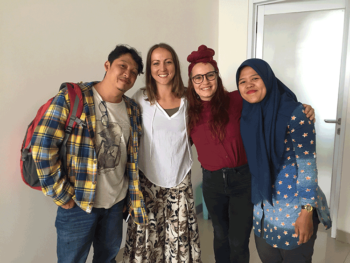
Congratulations to all of DSIP Semester 45 students on all of the fantastic achievements this semester!
